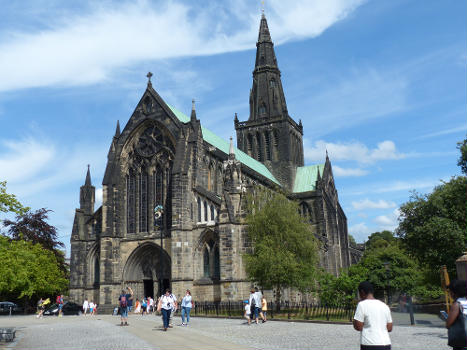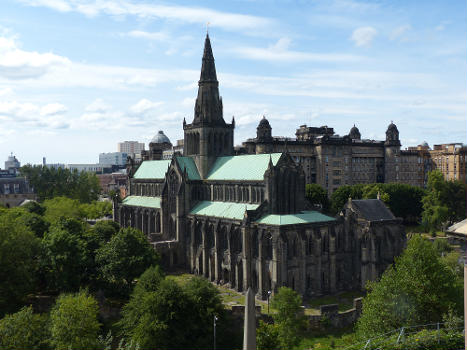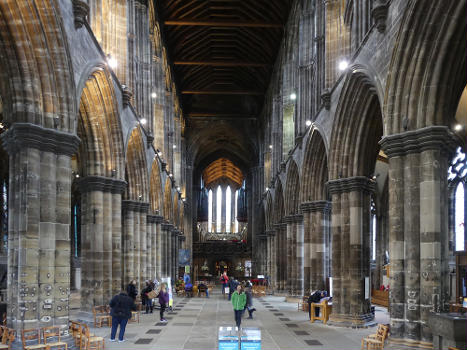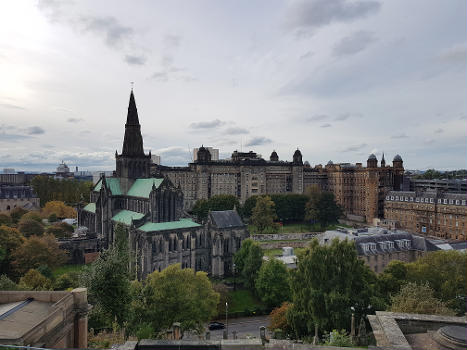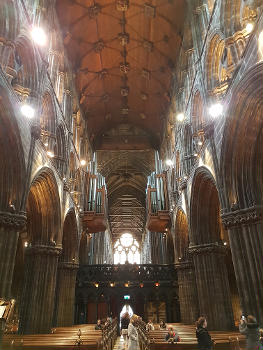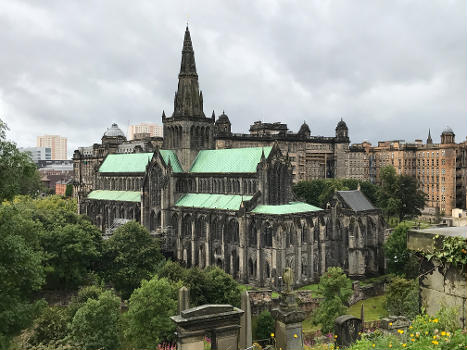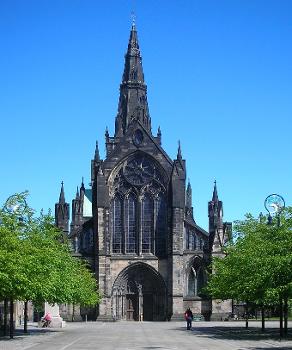General Information
| Other name(s): | High Kirk of Glasgow; Glasgow Cathedral |
|---|---|
| Status: | in use |
Project Type
| Function / usage: |
Cathedral |
|---|---|
| Material: |
Masonry structure |
| Architectural style: |
Gothic |
Awards and Distinctions
Location
| Location: |
Glasgow, Scotland, United Kingdom |
|---|---|
| Coordinates: | 55° 51' 46.80" N 4° 14' 3.98" W |
Technical Information
Dimensions
| width | 20 m | |
| height | 32 m | |
| length | 87 m | |
| tower | height | 68 m |
Excerpt from Wikipedia
Glasgow Cathedral, also called the High Kirk of Glasgow or St Kentigern's or St Mungo's Cathedral, is the oldest cathedral on mainland Scotland and is the oldest building in Glasgow. Since the Reformation the cathedral continues in public ownership, within the responsibility of Historic Environment Scotland. The congregation is part of the established Church of Scotland's Presbytery of Glasgow and its services and associations are open to all. The cathedral and its kirkyard are at the top of High Street, at Cathedral Street. Immediately neighbouring it are Glasgow Royal Infirmary, opened in 1794, and the elevated Glasgow Necropolis, opened in 1833. Nearby are the Provand's Lordship, Glasgow`s oldest house and its herbal medical gardens, the Barony Hall (Barony Church), University of Strathclyde, Cathedral Square, Glasgow Evangelical Church (North Barony Church), and St Mungo Museum.
History
The history of the cathedral is linked with that of the city, and is allegedly located where the patron saint of Glasgow, Saint Mungo, built his church. The tomb of the saint is in the lower crypt. Walter Scott's novel Rob Roy gives an account of the kirk.
Built before the Reformation from the late 12th century onwards and serving as the seat of the Bishop and later the Archbishop of Glasgow, the building is a superb example of Scottish Gothic architecture. It is also one of the few Scottish medieval churches (and the only medieval cathedral on the Scottish mainland) to have survived the Reformation not unroofed.
James IV ratified the treaty of Perpetual Peace with England at the high altar on 10 December 1502. The cathedral and the nearby castle played a part in the battles of Glasgow in 1544 and 1560. Twenty years after the Reformation, on 22 April 1581 James VI granted the income from a number of lands to Glasgow town for the kirk's upkeep. He traced the ownership of these lands to money left by Archbishop Gavin Dunbar as a legacy for repairing the cathedral. The town council agreed on 27 February 1583 to take responsibility for repairing the kirk, while recording they had no obligation to do so. The church survives because of this resolution. Inside, the rood screen is also a very rare survivor in Scottish churches.
The cathedral has been host to number of congregations and continues as a place of active Christian worship, hosting a Church of Scotland congregation. The current minister (since April 2019) is the Rev Mark E. Johnstone, who was previously minister at St. Mary's Church, Kirkintilloch. The building itself is in the ownership of the Crown, is maintained by Historic Scotland, and is a popular destination for tourists.
University of Glasgow
The University of Glasgow originated in classes held within the precinct of the Cathedral. William Turnbull, Bishop of Glasgow was primarily responsible for the foundation of the University around the year 1451. In 1460, the University moved out of the Cathedral to an adjacent site on the east side of the High Street, known locally as The College, and moved to its current home on Gilmorehill in 1870.
Text imported from Wikipedia article "Glasgow Cathedral" and modified on July 23, 2019 according to the CC-BY-SA 4.0 International license.
Participants
Currently there is no information available about persons or companies having participated in this project.
Relevant Web Sites
Relevant Publications
- (2004): New bosses for the roof of Glasgow Cathedral choir. In: Architectural Heritage, v. 15, n. 1 (November 2004), pp. 117-128.
- About this
data sheet - Structure-ID
20026268 - Published on:
19/02/2007 - Last updated on:
14/05/2024

